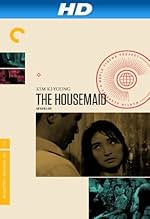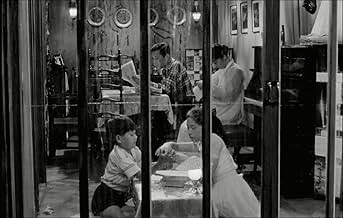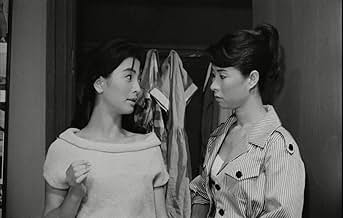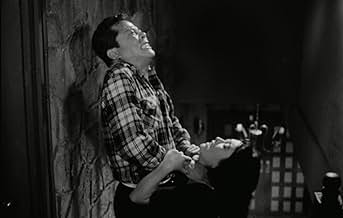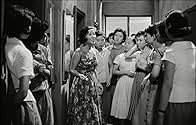ÉVALUATION IMDb
7,2/10
6,4 k
MA NOTE
Un compositeur et sa femme sont emportés dans la tourmente lorsqu'une servante affiche un comportement inattendu.Un compositeur et sa femme sont emportés dans la tourmente lorsqu'une servante affiche un comportement inattendu.Un compositeur et sa femme sont emportés dans la tourmente lorsqu'une servante affiche un comportement inattendu.
Kim Jin-kyu
- Dong-sik Kim
- (as Jin Kyu Kim)
Ahn Sung-ki
- Chang-soon Kim
- (as Sung-kee Ahn)
Avis en vedette
Suicides, attempted suicides, blackmail, murder, attempted murder, adultery, paranoia -- the goings-on in this bizarre and fascinating melodrama put even MANJI to shame.
No wonder one critic calls director Kim "Douglas Sirk on acid" -- while Western audiences may laugh at some of the overheated melodrama, this potboiler nonetheless is pretty wild for 1960, and manages to be both lurid and unforgettable. (It's also got one of the great death scenes *ever* -- see for yourself!)
No wonder one critic calls director Kim "Douglas Sirk on acid" -- while Western audiences may laugh at some of the overheated melodrama, this potboiler nonetheless is pretty wild for 1960, and manages to be both lurid and unforgettable. (It's also got one of the great death scenes *ever* -- see for yourself!)
I haven't seen before melodrama as stunning, shocking, utterly ridiculous and in full knowledge of it, Korea's cautionary tale answer on marital infidelity to Reefer Madness if it weren't at the same time as cinematically vibrant and obstinate as the best works of Sam Fuller, driven by suspenseful will and heavy with undertones of something at once sinister and horrifying to make you think parts of it were destined at some point for Les Diaboliques or Whatever Happened to Baby Jane, as Ki-young Kim's The Housemaid; for all intents and purposes, this is melodrama a-go-go, not in the cosmopolitan sense of the term, but ironic and campy, a dazzling movie steeped in artifice and insanely interesting human behaviour that sets out to provoke and push common sense to a limit.
A well to do couple hires a maid to help out the wife with the chores around the house, but no sooner has she gone into the kitchen to get a glass of water than the entire household threatens to collapse in ruins of rat poison and unwanted pregnancies, illicit thrysts and alliances striken casually and alternatively between the wife and the maid who is now a mistress, the wife and the husband against the maid who they need to be rid off before she talks of the affair, the maid and the husband against each other and their own selves.
The other movie I've seen by Ki-young Kim is, Iodo, a Korean version of The Wicker Man that takes place in a remote island populated exclusively by fisherwomen. It was also utterly bonkers, the most outrageous plotting this side of Italian exploitation, but it lacked the ability to see that in itself, to recognize the madness and defy it. The Housemaid at first seems like the product of Ed Wood incompetence. Some of the dialogue and character behavior had me in stitches. But it soon reveals that to be a facade which the movie can lift and put back in place at whim, so that it can be all things to all people not because of any particular notion of ambiguity shared by Ki-young Kim because the movie is blunt like a hammer in the face, but because it doesn't abide by any notion of common sense or realism unless it wants to. The movie behaves with the same audacity of its maid protagonist. It sets up an image of a socially upwards mobile household where a couple can afford to buy a television even if it means hours of slaving away on a sewing machine to get it, and then affronts it violently, perversely toys with it and corrupts it to the heart.
In the end, if any more clue was required, we get fourth walls broken and a man winking straight at us. This is Panic Theater at its best, with the selfaware avant-garde tropes replaced by unselfconscious soap opera clichés.
A well to do couple hires a maid to help out the wife with the chores around the house, but no sooner has she gone into the kitchen to get a glass of water than the entire household threatens to collapse in ruins of rat poison and unwanted pregnancies, illicit thrysts and alliances striken casually and alternatively between the wife and the maid who is now a mistress, the wife and the husband against the maid who they need to be rid off before she talks of the affair, the maid and the husband against each other and their own selves.
The other movie I've seen by Ki-young Kim is, Iodo, a Korean version of The Wicker Man that takes place in a remote island populated exclusively by fisherwomen. It was also utterly bonkers, the most outrageous plotting this side of Italian exploitation, but it lacked the ability to see that in itself, to recognize the madness and defy it. The Housemaid at first seems like the product of Ed Wood incompetence. Some of the dialogue and character behavior had me in stitches. But it soon reveals that to be a facade which the movie can lift and put back in place at whim, so that it can be all things to all people not because of any particular notion of ambiguity shared by Ki-young Kim because the movie is blunt like a hammer in the face, but because it doesn't abide by any notion of common sense or realism unless it wants to. The movie behaves with the same audacity of its maid protagonist. It sets up an image of a socially upwards mobile household where a couple can afford to buy a television even if it means hours of slaving away on a sewing machine to get it, and then affronts it violently, perversely toys with it and corrupts it to the heart.
In the end, if any more clue was required, we get fourth walls broken and a man winking straight at us. This is Panic Theater at its best, with the selfaware avant-garde tropes replaced by unselfconscious soap opera clichés.
Allow me to add to the hype: this film is as delirious as they come. Starting out as a typical realist glance into 1960's South Korea as centered on a upwardly-mobile family, after the plot gets settled, becomes a hysterical and expressionistic tale of corrosive sin and deception. The transformation of one night's flirtation into a grandiose moral eradication is the one of the most stunning turns of atmosphere I've ever seen in a film. Also amazing is how your view of the characters changes dramatically as they are faced with this living hell. While researching about the director, I found out that the actress who played the housemaid, Eun-shim Lee, fulfilled the part so well that she couldn't find work after this movie. Audience members were literally screaming for her death at the original showings! See this film just for her, you won't regret it! I can't say enough great things about the director Kim Ki-young, too bad most of his films aren't available in English!
I bought this film on NTSC-VHS format from an online Korean business called koreapop.com. The copy evidently had been put together from two or three diffrent copies of the film, since some parts of the film looked like they were in better shape than others, and also there were English subtitles in some parts, but not most others. (Note that I bought this film knowing that it would be in Korean, with no subtitles).
This movie features what is probably the first scene in cinematic history where a woman rapes a man- a whole 25 years before Isabella Rosellini raped Kyle McCallahan in "Blue Velvet"! As a Korean movie, it's story challenges traditional Korean propriety. The housemaid character is a castrating hose-beast: Not exactly the kind of Korean woman portrayed in most Korean movies made then or now. Director Kim Kiyoung tends to turn the conventional Korean-movie plotline on its head in this movie, since there is no real "happy-ending", in fact, things just seem to get worse and worse. The only other Korean movie similar to it in this sense, is the recently released "Kilimanjaro" (also an EXCELLENT film). This movie is indeed a Korean-movie classic. It's just too bad that the remaining copies of such classic Korean films are not given the best of care, since many, like this one, are in fairly rough shape. I hope that the Koreans will take more pride in their cinematic history and prepare for better archival storage and restoration of their nation's film legacy.
This movie features what is probably the first scene in cinematic history where a woman rapes a man- a whole 25 years before Isabella Rosellini raped Kyle McCallahan in "Blue Velvet"! As a Korean movie, it's story challenges traditional Korean propriety. The housemaid character is a castrating hose-beast: Not exactly the kind of Korean woman portrayed in most Korean movies made then or now. Director Kim Kiyoung tends to turn the conventional Korean-movie plotline on its head in this movie, since there is no real "happy-ending", in fact, things just seem to get worse and worse. The only other Korean movie similar to it in this sense, is the recently released "Kilimanjaro" (also an EXCELLENT film). This movie is indeed a Korean-movie classic. It's just too bad that the remaining copies of such classic Korean films are not given the best of care, since many, like this one, are in fairly rough shape. I hope that the Koreans will take more pride in their cinematic history and prepare for better archival storage and restoration of their nation's film legacy.
"Hanyo" ("The Housemaid") works like a very good piece of classical music: It has a slow beginning that seems to go forever, then it adds some crescendos here and there to makes us alarmed, creating a thrilling suspense and a dramatic situation that leads to a powerful and killer ending. You might applause after all that, both the music and the film because when you see the whole picture you realize what a wonderful and memorable works of art they are.
The housemaid of the title is a dangerous female student who enters in the life of a married piano teacher trying to get love from him, no matter if the teacher's wife and kids will suffer so that they can be together. The teacher is controlled by both housemaid and the wife, and he needs to make a decision fast before things get worse for everyone. Here's a story about the value of family in the middle of betrayals, delusions, obsession, tradition, real love versus psychotic forms of love, and plenty of more keywords you may think.
At times "Fatal Attraction" appeared in my mind since there's a significant similarity between both films, and if the story sounds like cliché it is but you must see how it works and who is working with. We're talking about a Korean film and as some of us know, Asian females in older films didn't have the kind of roles the women had in here, powerful and energetic characters that almost boss around with the only men in the story like he was a puppy dog. And the villain? Oh boy! She was one of the most dramatic and perfectly well written villains of all time. Frightening, desperate to the point of threatening the teacher's kids who gets suspicious of everything she serves to them thinking they might get poisoned, this woman knows how to find a answer to everything in order to ruin people's lives, from false rumors to murder.
Don't be let down by the slowness of the first half hour (the characters introduction), try to stay focused all the time and you'll be totally surprised until the very last minute. This is a great film! 9/10
The housemaid of the title is a dangerous female student who enters in the life of a married piano teacher trying to get love from him, no matter if the teacher's wife and kids will suffer so that they can be together. The teacher is controlled by both housemaid and the wife, and he needs to make a decision fast before things get worse for everyone. Here's a story about the value of family in the middle of betrayals, delusions, obsession, tradition, real love versus psychotic forms of love, and plenty of more keywords you may think.
At times "Fatal Attraction" appeared in my mind since there's a significant similarity between both films, and if the story sounds like cliché it is but you must see how it works and who is working with. We're talking about a Korean film and as some of us know, Asian females in older films didn't have the kind of roles the women had in here, powerful and energetic characters that almost boss around with the only men in the story like he was a puppy dog. And the villain? Oh boy! She was one of the most dramatic and perfectly well written villains of all time. Frightening, desperate to the point of threatening the teacher's kids who gets suspicious of everything she serves to them thinking they might get poisoned, this woman knows how to find a answer to everything in order to ruin people's lives, from false rumors to murder.
Don't be let down by the slowness of the first half hour (the characters introduction), try to stay focused all the time and you'll be totally surprised until the very last minute. This is a great film! 9/10
Le saviez-vous
- AnecdotesThis was the first and the last film Eun-shim Lee (Myung-sook) starred in. The public hated immoral Myung-sook so much that no director hired her after this film. [She may not have had a starring role, but she was hired for two films after this movie and also appeared in one movie previously.]
- Gaffes(at around 1h 29 mins) The girl, Ae-soon, gets out of bed surprisingly quickly and effortlessly for a young woman needing crutches.
- Citations
Dong-sik Kim: What does the law state about a man who cheats on his wife?
Lyu: [laughs] Sometimes he can get a lighter sentence than for a traffic violation. Once his wife forgives him, he's acquitted. Just as you wouldn't tell your son you're a murderer of a thief, even between couples some things should be kept secret.
- ConnexionsFeatured in Donui mat (2012)
Meilleurs choix
Connectez-vous pour évaluer et surveiller les recommandations personnalisées
Détails
- Durée
- 1h 49m(109 min)
- Couleur
- Mixage
- Rapport de forme
- 1.37 : 1
Contribuer à cette page
Suggérer une modification ou ajouter du contenu manquant


